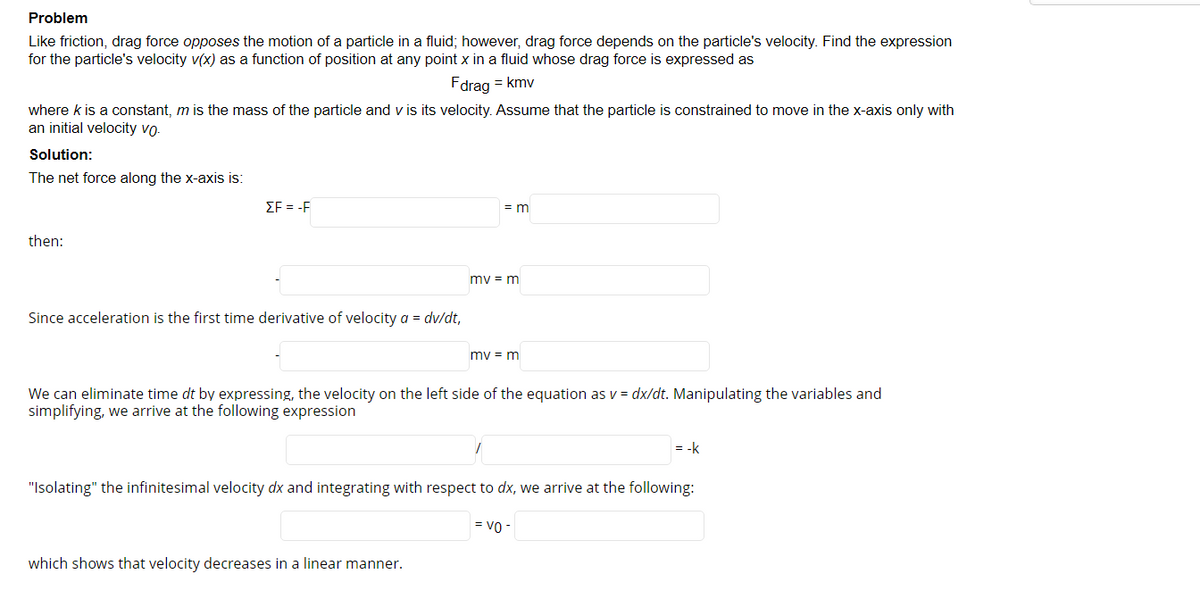Problem Like friction, drag force opposes the motion of a particle in a fluid; however, drag force depends on the particle's velocity. Find the expression for the particle's velocity v(x) as a function of position at any point x in a fluid whose drag force is expressed as Fdrag = kmv where k is a constant, m is the mass of the particle and v is its velocity. Assume that the particle is constrained to move in the x-axis only with an initial velocity vo- Solution: The net force along the x-axis is: ΣF-F = m then: mv = m Since acceleration is the first time derivative of velocity a = dv/dt, mv = m We can eliminate time dt by expressing, the velocity on the left side of the equation as v = dx/dt. Manipulating the variables and simplifying, we arrive at the following expression = -k "Isolating" the infinitesimal velocity dx and integrating with respect to dx, we arrive at the following: = v -
Problem Like friction, drag force opposes the motion of a particle in a fluid; however, drag force depends on the particle's velocity. Find the expression for the particle's velocity v(x) as a function of position at any point x in a fluid whose drag force is expressed as Fdrag = kmv where k is a constant, m is the mass of the particle and v is its velocity. Assume that the particle is constrained to move in the x-axis only with an initial velocity vo- Solution: The net force along the x-axis is: ΣF-F = m then: mv = m Since acceleration is the first time derivative of velocity a = dv/dt, mv = m We can eliminate time dt by expressing, the velocity on the left side of the equation as v = dx/dt. Manipulating the variables and simplifying, we arrive at the following expression = -k "Isolating" the infinitesimal velocity dx and integrating with respect to dx, we arrive at the following: = v -
Principles of Physics: A Calculus-Based Text
5th Edition
ISBN:9781133104261
Author:Raymond A. Serway, John W. Jewett
Publisher:Raymond A. Serway, John W. Jewett
Chapter5: More Applications Of Newton’s Laws
Section: Chapter Questions
Problem 61P
Related questions
Question

Transcribed Image Text:Problem
Like friction, drag force opposes the motion of a particle in a fluid; however, drag force depends on the particle's velocity. Find the expression
for the particle's velocity v(x) as a function of position at any point x in a fluid whose drag force is expressed as
Fdrag = kmv
where k is a constant, m is the mass of the particle and v is its velocity. Assume that the particle is constrained to move in the x-axis only with
an initial velocity vo-
Solution:
The net force along the x-axis is:
ΣF-F
= m
then:
mv = m
Since acceleration is the first time derivative of velocity a = dv/dt,
mv = m
We can eliminate time dt by expressing, the velocity on the left side of the equation as v = dx/dt. Manipulating the variables and
simplifying, we arrive at the following expression
= -k
"Isolating" the infinitesimal velocity dx and integrating with respect to dx, we arrive at the following:
= vo -
which shows that velocity decreases in a linear manner.
Expert Solution
This question has been solved!
Explore an expertly crafted, step-by-step solution for a thorough understanding of key concepts.
Step by step
Solved in 3 steps with 3 images

Knowledge Booster
Learn more about
Need a deep-dive on the concept behind this application? Look no further. Learn more about this topic, physics and related others by exploring similar questions and additional content below.Recommended textbooks for you

Principles of Physics: A Calculus-Based Text
Physics
ISBN:
9781133104261
Author:
Raymond A. Serway, John W. Jewett
Publisher:
Cengage Learning

Classical Dynamics of Particles and Systems
Physics
ISBN:
9780534408961
Author:
Stephen T. Thornton, Jerry B. Marion
Publisher:
Cengage Learning

University Physics Volume 1
Physics
ISBN:
9781938168277
Author:
William Moebs, Samuel J. Ling, Jeff Sanny
Publisher:
OpenStax - Rice University

Principles of Physics: A Calculus-Based Text
Physics
ISBN:
9781133104261
Author:
Raymond A. Serway, John W. Jewett
Publisher:
Cengage Learning

Classical Dynamics of Particles and Systems
Physics
ISBN:
9780534408961
Author:
Stephen T. Thornton, Jerry B. Marion
Publisher:
Cengage Learning

University Physics Volume 1
Physics
ISBN:
9781938168277
Author:
William Moebs, Samuel J. Ling, Jeff Sanny
Publisher:
OpenStax - Rice University

Physics for Scientists and Engineers: Foundations…
Physics
ISBN:
9781133939146
Author:
Katz, Debora M.
Publisher:
Cengage Learning